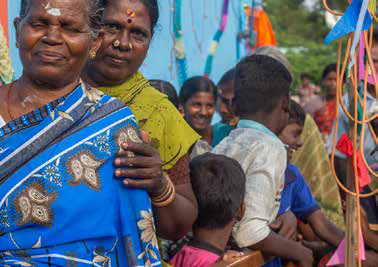
Description of the project: Kynarou is developing an inclusive and sustainable development model with 10 Dalits (“untouchable” caste) communities in Tamil Nadou, India. Starting from the supply of drinking water and access to decent sanitation, this project runs an exemplary model of sustainable and inclusive development with the villagers, ranging from ecological treatment of wastewater to integrated solid waste management, including the creation of 120 organic vegetable gardens. With this comprehensive approach, Kynarou aims to increase the climatic resilience of the entire Vaigai River watershed, counting on the support of local authorities.
Climate impact: This project responds to a key – but little recognized – challenge of climate change: the disruption of the water cycle, which influences local thermoregulation. It contributes to mitigation and adaptation through the protection of groundwater and the responsible use of water resources, soil regeneration through the use of compost and filtered wastewater, reduction of pollution due to waste. When scaled up, this approach can improve the resilience of a catchment draining more than 7000 km2.
Gender impact: Improving hygiene and living conditions positively impacts women in priority through access to dignified sanitation, which limits gender-based violence, reduces urinary tract infections and increases the enrollment of girls. In addition, this project promotes the work and autonomy of women through village management committees that enable them to access decision-making processes in their village and exercise their civic rights.
Scalability / replicability: Based on the needs of the population, and supporting the appropriation of infrastructure by communities through the concept of village committees, Kynarou has already replicated its actions in 50 villages, improving the lives of 100,000 marginalized people. Since 2016, South-South cooperation with Burkina Faso and Madagascar has been put in place.